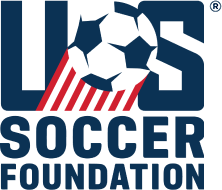

Coach Natalia has always led an active lifestyle, particularly as it relates to soccer. Surrounded by soccer-crazed cousins, Natalia first touched a soccer ball when she was in elementary school. As an adult, her love of the game brought her into coaching.
Last year, a high school friend told Natalia about a different kind of coaching opportunity through Active Children Portland, one of the U.S. Soccer Foundation’s Soccer for Success partners. It seemed right up her alley, but there was one thing that created pause: the journey, which would require that she travel from Vancouver, Washington to Portland three to four times per week to coach.
POSITIVE RESULTS
It only took Natalia a short while of coaching Soccer for Success to see positive results and to know that the trek was worth it. “I went to go check it out and see what the program is about, and I liked it,” she recalls. “I liked what they were doing.”
One of the U.S. Soccer Foundation’s core components of the Soccer for Success program is mentorship. Through a partnership between Latino Network’s SUN program and Active Children Portland, Natalia has her group of participants from 2:15 p.m. to 5:00 p.m. Monday through Friday. This time includes recess, an academic portion, supper, and a soccer session. Over time, Natalia has seen how her role as a coach and a mentor has benefited her participants and their families and how the lessons she has taught them extend into their daily lives.

“I see them drinking more water, I see them counting their calories on their lunch break and it’s really cool to see them learning all this and that they’re actually applying it in their daily lives.”
“Overall,” she says of her participants, “they’re just becoming leaders in the community.”
Not only are the participants making healthy changes, so too are their families. “I see the parents getting more involved and coming to see the games,” Natalia notes. “The parents are also asking questions about changing their habits and all the concerns the kids have on cutting off the sugar, cutting off stuff like that.”
IT DOESN’T STOP THERE
Natalia learned early on in her experience with Soccer for Success just how important mentorship was. Little did she know how much she, too, would benefit from the relationships she formed.
Maria Paz Herrera, the SUN site manager at Rigler Elementary where Natalia coaches, has seen the ways in which Natalia has changed during her time as a coach and, importantly, as a mentor. “I think something that has been transformational for her is that the model in Active Children Portland is not just coaching soccer,” Maria says. “It’s about mentoring and building relationships and so I think that’s really created a shift in her perspective in the way that she coaches. I think she came more with a coaching background, but has really well-adapted to [the mentor side].”

“For me, it has helped me understand kids a bit more, getting close to them, realizing what they need and how to better help the community overall,” Natalia says, “whether it’s in Portland or here in my community in Vancouver.”
“Natalia is really great with the students,” Maria continues. “She is demanding of them, she keeps a high standard for them, but she’s also very loving and so that’s also very nice to see – how she manages to do both.”
MORE THAN A GAME
Prior to serving as a site manager, Maria also participated as a student mentor, but she is quick to point out that her role did not involve the integration of soccer. Having seen the positive effects of the program in her past year as a site manager, she notes soccer’s unique ability to reach students through something that excites them.
“I think generally speaking, soccer is something that students are interested in and passionate about,” she says. “I think there’s also a need for mentorship. It goes well together in that way.”
Maria goes on to note that there is a large Latino population in the communities they serve. In fact, almost half of Active Children Portland’s Soccer for Success participants are Hispanic or Latino. The same can be said about the demographic makeup of its coach-mentors. “In Latino culture, soccer is a big deal,” she maintains. “I’ve worked with many students and their dream is to grow up and be a soccer player and so sometimes the avenues for that are unknown.”
But Maria says that the soccer program “gives them that discipline that sometimes they’re lacking…If they’re doing something that they’re engaged in, it’s gives them extra motivation.”
For Natalia, who had an abundance of experience as a coach prior to becoming a coach-mentor, Soccer for Success goes one step further. “I’ve had a lot of different teams of different ages,” she begins. “I only get to see them during practice. I’m there to do my job, coach them, let’s get this thing going, we do practice, cooldown, and boom – they go home…When it’s soccer time, they respect me, but I don’t know what they do on the site, how they’re doing in school, do they need help, is there something going on at home, their eating habits, is somebody struggling, is everybody OK. I don’t get to deeply know them.”
But Soccer for Success, she says, is more than that. “We teach them nutrition, we mentor them, whether it’s homework-related or it’s something else. And on top of it, there is soccer. So there’s a lot more engagement with the kids, more one-on-one getting to know this kid…It’s more than just soccer, which is what I feel kids need.”

The greatest gift for Natalia is that she knows it’s working. “You can see it because the kids are changing, and they’re changing for the better.”
January is National Mentoring Month. Learn more about how the U.S. Soccer Foundation’s Soccer for Success program integrates mentorship and other components to help participants, family members, and communities thrive.